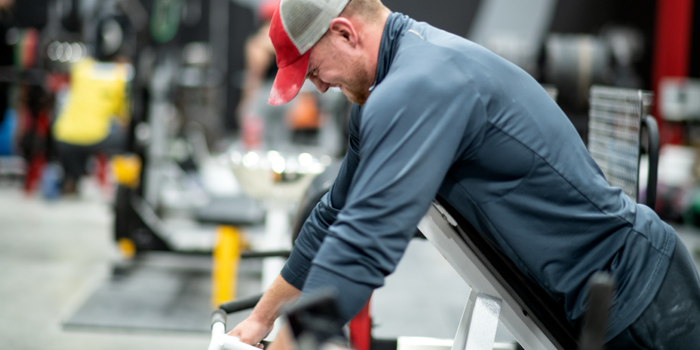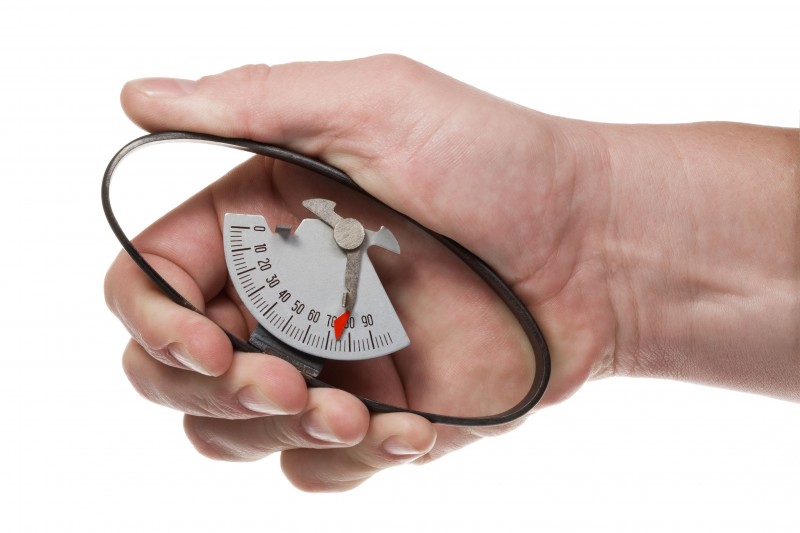
Have you trained really hard for a period of time and felt that you are making huge progress that never seems to end? You may have used some famous training program that promised results, which you also received. Then suddenly, you lose the power and struggle just to get back to where you were in the beginning. You may be overtraining! Read the article, and I will tell you how it works.
It’s quite easy to measure if the nervous system has become overloaded. Imagine that you have a really good training period and start to get the form before the competition. Suddenly, the results begin to sink, so you think it is probably because you trained so hard and that your muscles will recover before the competition and get a peak of maximum strength. But it does not happen; on the contrary, you become even weaker. You've overtrained!
RECENT: Become 53% Stronger by Using Your Imagination
There are a few methods to measure how hard you have pushed the nervous system from recovery. One method is simple, and the other method a little more complicated.
In order to measure your nervous system’s standards, you can use jumps and test each day how high you can jump by marking your hand against the wall. If you have a yardstick, measure the height from the ceiling. You’ll soon see that you'll tend to touch the same spot almost every day. If you suddenly notice that you are unable to jump as high as you usually do, then the body has not recovered from your previous training. This is a sign of your body being overtrained.
Another way of measurement, which I personally think is better because it is difficult to stand and jump every day. Most preferably, if you do not have a high ceiling, use a hand dynamometer.

Eremin Sergey © 123rf.com
If you squeeze your hand every day, you will soon have an average value of how hard you can pinch it together. Assume you try each day for a month and note that the number is 154 pounds, give or take five pounds. If you suddenly only get up to 143 pounds one morning, it is a sign that you are about to be overtrained. Then you have the choice of either resting or exercising in a way that does not burden the nervous system as much.
It is important to keep in mind that conditions around when doing the test should always be the same. For example, you do it right in the morning on an empty stomach. If you went to bed late at night or eaten unusually much the day before or for breakfast, these things can impact the result. Similarly, if you had screaming toddlers at home or partying neighbors that disturbed your night's sleep, you’ll take the result not too seriously if you know with that you have different conditions but it should not be too different from your standard.
You don’t always have to train too much to become overtrained; it can also be a sign of you not getting enough recovery. “There is no such thing as overtraining. There is just undereating or undersleeping.” If you get enough recovery, then you will not be overtrained.
Too often, we only focus on how we train and forget that it is the body's ability to recover that plays the biggest role. Sure, we must of course train, but if we do not get recovery, then we will fall. Imagine a trotting horse that will never stop. It runs lap after lap without stopping to eat, drink, or sleep. Then the horse runs until it dies. Instead of getting faster, its life ends.
When a horse runs a lap, we take it in and give it food and water. The horse is allowed to walk in a quiet garden and calm down to the yard and prepare for the next training. Then we let it run two laps. Repeat the same procedure and give it food and water and let it relax. Maybe a horse chiropractor shows you that everything is fine. We massage the muscles that are tense while we talk quietly with our racing horse. The more skilled the horse becomes, the more we understand the importance of its recovery. It can go from being peaceful and quiet to exploding on the racing track. Why would you be any different?
READ MORE: The Most Important Principle for Strength
If you could press one pound more than usual, then you should go for heavy training. If you dropped below the normal value one morning, do more reps.
It is a simple method, but it still requires that you have quite a good structure on their days and that not too much differs from day to day. In my case, I work pretty much, have toddlers and the days can look very different. When you test the hand strength with the dynamometer, you should aim to do so under the same conditions every day. The best thing is to do it immediately when you wake up. If you wait until just before the training session, there is a lot that can affect.
In conclusion, I would like to say that I think it may be good to check this way over a period if you train hard. You should, however, learn to know your body so well that you’re not forced to use this method every day. Basically, it is about body awareness and it can be a good way to increase awareness. If you belong to the elite, then each percent counts and then it could be a method to take advantage of this method. For average people, just the knowledge of this method can be enough of an insight into how their body works.
In this article, you learned:
- How to avoid being overtrained.
- How to develop faster sometimes with less training.
- About hand dynamometers, an easy method for learning better body awareness.
- How to use this method to evaluate how you correspond to different training systems.











If you’re an individual who wants to measure your grip strength you test every morning under the same circumstances. Ones results could differ under the day because of how recovered your body are at the moment, how much you have eat since you wake up, how much stress you’re exposed to. But when you have an group of people, they can differ at both ways (some are stronger and some are weaker) and the measurement of the whole group are proplably more accurate than on one individual. It’s the same with BMI (body mass index), it can work for an group or a population but will never tell the truth if used only at one individual.
Stay strong! /Stefan
Do you have research suggesting the efficacy of using a Hand Dynamometer to Measure Your Recovery in active individuals?
Thank you!